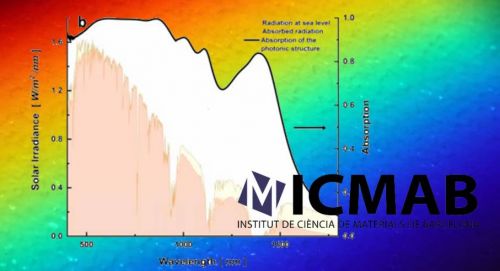
15/02/2018
ICMAB traps sunlight with superabsorbent nanomaterials
ICMAB traps sunlight with superabsorbent nanomaterials
In renewable energies, increasing efficiency is a key challenge in the production of “photovoltaic” electrons. This includes elaborating materials that can absorb the largest possible sunlight spectrum.
Great news from the Institute of Materials Science of Barcelona (ICMAB), a Barcelona Synchrotron Park’s partner: researchers led by Dr. Agustín Mihi, have created materials that largely absorb a wide range of the solar spectrum, between 400 and 1500 nm (visible light and infrared radiations), using an ultrathin layer of less than 100 nm thick of material.
The followed strategy, low cost and fully scalable, is based on combining the thin layer deposition of semiconductors on metals, and the nanostructuring of the material forming photonic crystals. The obtained superabsorbers materials have many potential applications, especially in the field of photovoltaic energy and photodetection.
Moreover, the researchers provide, in the study published in Advanced Materials, the design guidelines to synthesize other types of materials following the same strategy.
Great news from the Institute of Materials Science of Barcelona (ICMAB), a Barcelona Synchrotron Park’s partner: researchers led by Dr. Agustín Mihi, have created materials that largely absorb a wide range of the solar spectrum, between 400 and 1500 nm (visible light and infrared radiations), using an ultrathin layer of less than 100 nm thick of material.
The followed strategy, low cost and fully scalable, is based on combining the thin layer deposition of semiconductors on metals, and the nanostructuring of the material forming photonic crystals. The obtained superabsorbers materials have many potential applications, especially in the field of photovoltaic energy and photodetection.
Moreover, the researchers provide, in the study published in Advanced Materials, the design guidelines to synthesize other types of materials following the same strategy.
More news
16/09/2014
SENER awarded its first contract with Embraer
09/09/2014
From brick to neuron
02/09/2014
The UAB University is strengthening its position in the Shanghai ranking
27/08/2014
Ascamm develops a drone for rescues
20/08/2014
SENER and ESA reach an agreement for the prime contractor role on the Proba 3 mission
06/08/2014
The Catalan Institute for Nanoscience and Nanotechnology receives the Severo Ochoa accreditation









